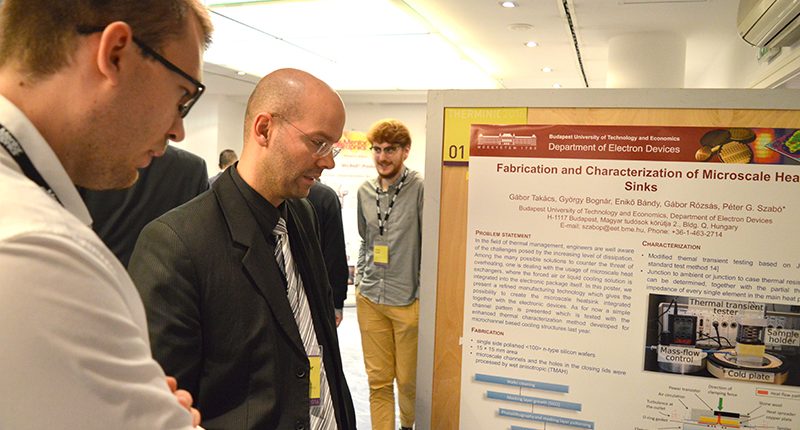Research, development and innovation in the Department of Electron Devices
Research and development activities at the Department of Electron Devices traditionally are connected to design of integrated circuits and novel active devices and have a special focus on thermal & reliability issues of electronics, microelectronics, photovoltaic devices and solid-state lighting; on MEMS and smart system integration including practical realization of CPS and IoT applications. In 2019, these activities were supported by several H2020 and different OTKA projects.
The flagship R&D activity of the Department is related to the multi-physical, especially thermal, electro-thermal issues of integrated systems at micro- and nanoscale. In this area our Department is one of the best-known research centers world-wide. The Department has been one of the main organizers of the international THERMINIC conferences in the past 20 years. Involving young researchers the widening R&D activity of the Department also includes photovoltaic devices, Lab-on-a-Chip devices. Young researchers and students of our Department had significant contribution to the design and realization of the first Hungarian satellite Masat-1.
The latest research areas of our Department include:
- thermal transient testing followed by structure function analysis to check the quality of the heat-removal properties of semiconductor device packages and thermal management solutions including TIMs
- novel integrated cooling solutions for 3D ICs, printed circuit boards and solar cells
- material characterization with the above method including the in-situ monitoring of aging of different structural elements of a semiconductor device package during reliability testing
- combined thermal and radiometric/photometric measurement, modelling and simulation of power LEDs
- new innovative thermal simulation algorithms, layout-based fully coupled transistor level electro-thermal simulation of analog IC circuit blocks and logi-thermal simulation of digital ICs
- thermo-electric circuits (TELC) based on conceptually new devices called phonsistors (in cooperation with the Oulou University, Finland)
- micro-calorimetry of enzyme reactions implemented as two-phase Taylor flow in microfluidic devices (in cooperation with the Department of Organic Chemistry and Technology of BME)
- development of new test techniques and test benches for the multi-physical characterization of solar cells
More information regarding our research can be accessed in numerous publications, published in international and national scientific journals and in conference proceedings.

One of our colleagues presenting his poster at the THERMINIC 2016 conference.
In addition, according to the available infrastructure and the regulation of the University, we offer services, consultation and mentoring for our industrial and academic partners.
